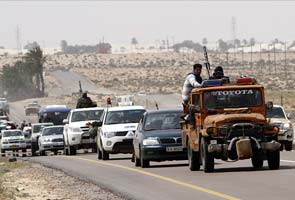
Authorities say between two and four large missiles or bombs exploded in the compound early Monday, lightly wounding four people.
The buildings, described as locations where Gaddafi holds meetings, were badly damaged with the roof of one of the structures caved in.
The attack comes a day after Gaddafi's forces unleashed a barrage of shells and rockets at Misrata in an especially bloody weekend.
Muammar Gaddafi's forces unleashed a barrage of shells and rockets at Misrata on Sunday in an especially bloody weekend, countering Libyan government claims that the army was holding its fire into the western city.
Despite the barrage, which doctors say killed 32 and wounded dozens in two days, rebels said they drove the last pro-government forces from the center of Libya's third-largest city. Morale among Gaddafi's troops fighting in Misrata has collapsed, with some abandoning their posts, said one captured Libyan soldier.
The battle for Misrata, which has claimed hundreds of lives in the past two months, has become the focal point of Libya's armed rebellion against Gaddafi since fighting elsewhere is deadlocked.
Video of Misrata civilians being killed and wounded by Gaddafi's heavy weapons, including Grad rockets and tank shells, have spurred calls for more forceful international intervention to stop the bloodshed in the rebel-held city.
In Washington, three members of the Senate Armed Services Committee said more should be done to drive Gaddafi out of power, including targeting his inner circle with airstrikes. Gaddafi "needs to wake up every day wondering, 'Will this be my last?'" Sen. Lindsey Graham, a Republican on the committee, told CNN's "State of the Union."
However, in Rome, Pope Benedict XVI offered an Easter prayer for diplomacy to prevail over warfare in Libya.
NATO's mandate from the U.N. is to try to protect civilians in Libya, split into a rebel-run east and a western area that remains largely under Gaddafi's control. While the coalition's airstrikes have delivered heavy blows to Gaddafi's army, they have not halted attacks on Misrata, a city of 300,000 people besieged by Gaddafi loyalists for two months.
Still, in recent days, the rebels' drive to push Gaddafi's men out of the city center gained momentum.
Late last week, they forced government snipers out of high-rise buildings. On Sunday, rebels took control of the main hospital, the last position of Libyan troops in the center of Misrata, said a city resident, who only gave his first name, Abdel Salam, for fear of reprisals. Throughout the day, government forces fired more than 70 rockets at the city, he said.
"Now Gaddafi's troops are on the outskirts of Misrata, using rocket launchers," Abdel Salam said.
A Misrata rebel, 37-year-old Lutfi, said there had been 300-400 Gaddafi fighters in the main hospital and in the surrounding area that were trying to melt into the local population.
"They are trying to run way," Lutfi said of the soldiers, speaking on condition of anonymity for fear of reprisals. "They are pretending to be civilians. They are putting on sportswear."
Ali Misbah, a captured Libyan soldier who had been wounded in the leg, was held under guard in a tent in the parking lot of the Al Hikmeh Hospital, one of the city's smaller medical centers.
Misbah, 25, said morale was low among Gaddafi's troops. "Recently, our spirit has collapsed and the forces that were in front of us escaped and left us alone," he said.
Misbah said he and his fellow soldiers were told that they were fighting against al-Qaida militants, not ordinary Libyans who took up arms against Gaddafi.
"They misled us," Misbah said of the government.
A senior Libyan government official has said the military is withdrawing from the fighting in Misrata, ostensibly to give a chance to tribal chiefs in the area to negotiate with the rebels. The official, Deputy Foreign Minister Khaled Kaim, said the tribal chiefs were ready to send armed supporters to fight the rebels unless they lay down their weapons.
Kaim also claimed that the army has been holding its fire since Friday.
Asked about the continued shelling on Misrata, Libyan government spokesman Moussa Ibrahim said the army was responding to attacks by rebels. He insisted that most of Misrata was still under government control.
Rebels on Sunday dismissed government claims that tribes in the area were siding with Gaddafi and that troops were redeploying voluntarily.
"It's not a withdrawal. It's a defeat that they want to turn into propaganda," said Dr. Abdel-Basit Abu Mzirig, head of the Misrata medical committee. "They were besieging the city and then they had to leave."
In addition to the casualties, thousands of people, many of them foreign workers, have been stranded in Misrata. Hundreds of migrants, along with wounded Libyans, have been evacuated in aid vessels through the port in recent days.
One of those wounded, Misrata resident Osama al-Shahmi, said Gaddafi's forces have been attacking the city with rockets. "They have no mercy. They are pounding the city hard," said al-Shahmi after being rescued from Misrata.
"Everyone in Misrata is convinced that the dictator must go," said al-Shahmi, 36, a construction company administrator who was wounded by shrapnel. His right leg wrapped in bandages, al-Shahmi flashed a victory sign as he was put into a waiting ambulance upon arrival in Benghazi.
In Rome, the pope told a crowd of more than 100,000 Easter pilgrims in St. Peter's Square that he hopes "diplomacy and dialogue replace arms" in Libya and that humanitarian aid will get through to those in need.


No comments:
Post a Comment